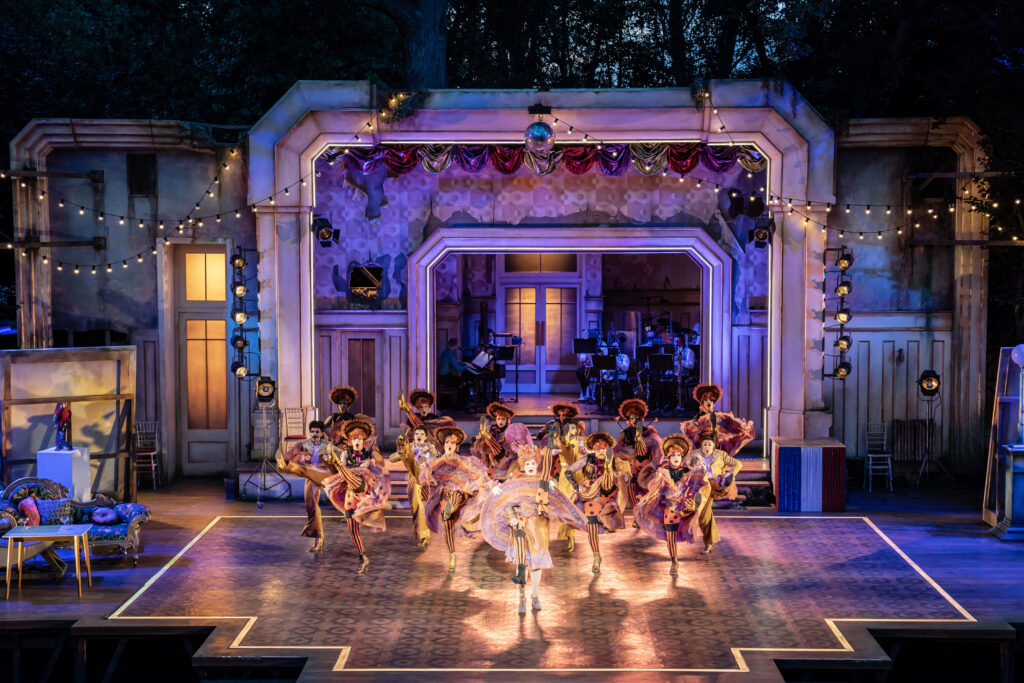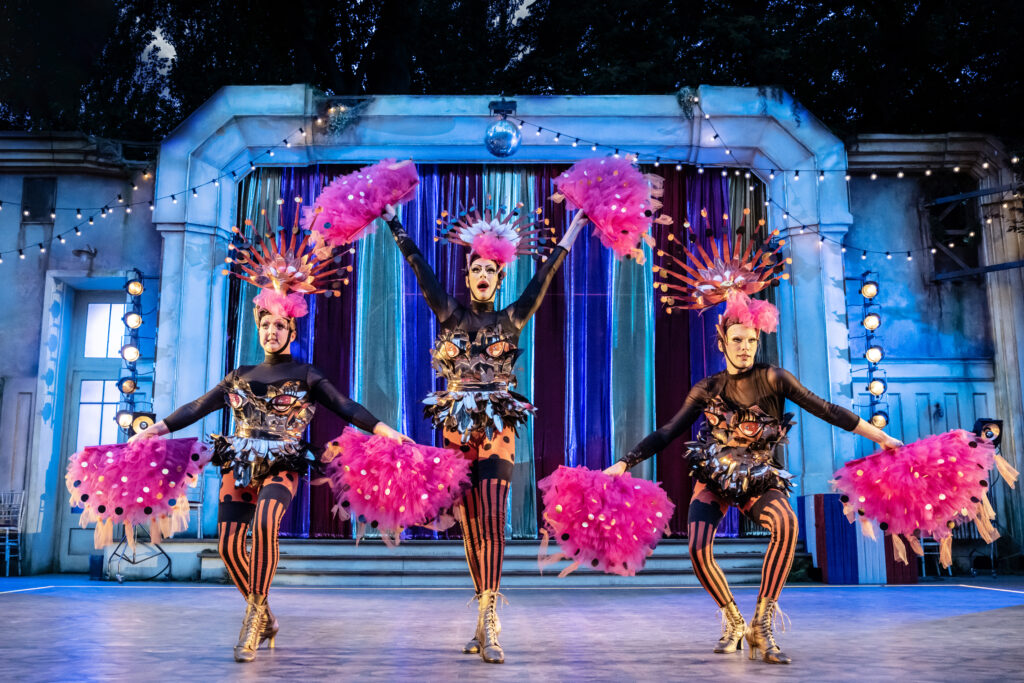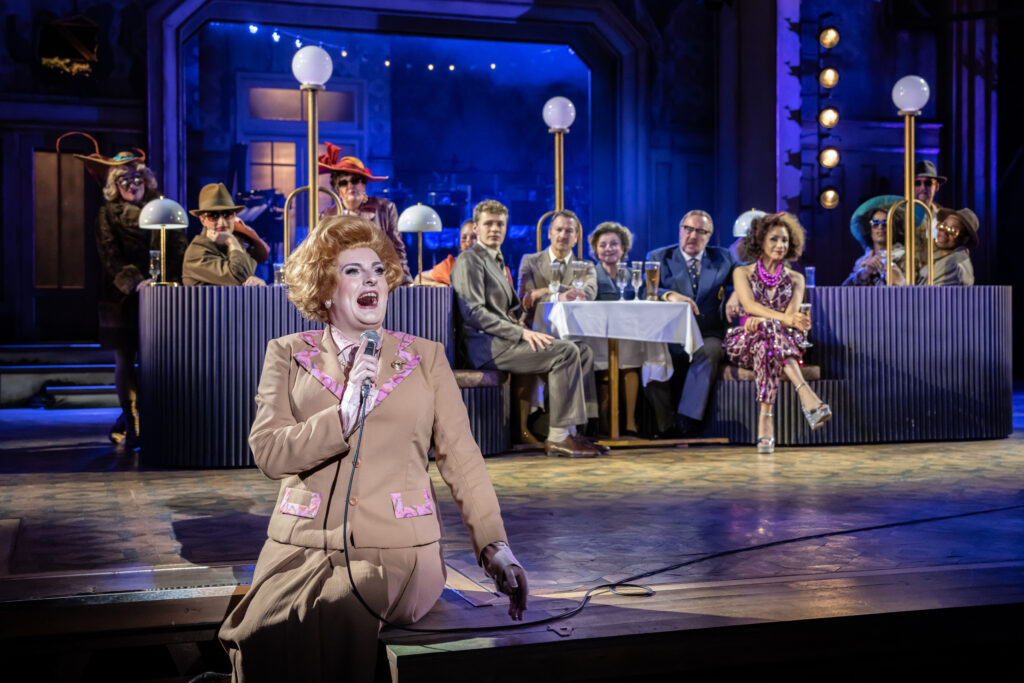AD: Media night invite
The long-awaited revival of Jerry Herman and Harvey Fierstein’s La Cage aux Folles has arrived at Regent’s Park Open Air Theatre, closing out the year’s summer season at the venue. Directed by OAT Artistic Director Timothy Sheader, the production celebrates the 40th anniversary of the text and is presented during an increasingly hostile climate towards the LGBTQ+ community – much the same as when the musical debuted on Broadway in 1983.
La Cage aux Folles is set in an eponymous drag nightclub in St. Tropez, following the relationship between club owner Georges (Billy Carter), lead performer and Georges’ spouse Albin (Carl Mullaney) and their son Jean-Mitchel (Ben Culleton) as he seeks to marry into a wealthy – but conservative – family, the Dindons. It’s a traditional musical farce, heavily focussed on drag and intended as a celebration of queer culture and queer spaces. As we follow the narrative, we see the struggles that are present within a gay family as well as the barriers placed by society and the motivations of those who want to prevent individuals from expressing their true selves.

It’s always a pleasure to see any production at the Open Air Theatre, and this was no exception. The versatile stage space has been transformed to show the proscenium of La Cage, being able to flip the perspective between the front and back of stage as necessary for the narrative. The production, set and costume design are exquisite, and by far the biggest strength of the show. Large tulle dresses, 70s-style flares, and classic cabaret/variety-style pieces all feature, showing off the talents of Les Cagelles (the drag chorus line ensemble) and really drawing in the audience’s focus during the big dance numbers.
Les Cagelles are a strong highlight of the show and really help to elevate the work put together by the creative team. Slick choreography and daring gymnastics fuse together to create enjoyable performance sequences executed by a talented team of individuals. The company is a well-oiled machine that does not miss a beat, even in the highest of heels. Stephen Mear’s choreography wouldn’t be out of place in a primarily dance-focussed show, and it’s a spectacle not to be missed.
As might be expected for something set in a club the fourth wall is broken frequently, with many characters interacting indirectly with audience members, as well as entering or departing the stage via the aisleways, side banks and more traditional points of the stage. It’s certainly a show that keeps us on our toes, and when you’re sucked into the pomp and fun you’re truly immersed in being an audience member of La Cage.
Unfortunately, for us, this same joy didn’t translate fully throughout the show. Whilst La Cage was ground-breaking during its Broadway run in 1983, it feels that very little of the book has been updated since then. This is a show that doesn’t really know what it wants to achieve in a modern context: the St. Tropez setting is unclear, as is the time period. This lack of commitment does let the show down when viewed through a modern lens, and is something that could have been tweaked.
For instance, the costuming is very traditional in its style and execution, yet more modern props are used to portray various settings. Similarly, although it was a joy to see drag kings so prominently shown alongside drag queens, much of the narrative was around ‘old school’ drag – something that is becoming increasingly problematic amongst the LGBTQ+ community. As a trans woman I felt very uncomfortable by needless references to genitalia and the over-the-top pastiches of gender, yet was captivated by the more modern, performance-style drag where three queens became chickens. I was truly through the looking glass at this point, but it was soon unfortunately shattered by more old-school references. It feels almost a missed opportunity to not update the show to focus on more modern drag styles within a modern setting, given that the overall commentary on bigotry is still as prominent in 2023 as it was in 1983. If this show was once liberating for the gay community, sadly – for me – it serves now to only reinforce those negative stereotypes. From a theatre which produced the revolutionary Legally Blonde only a year ago, the book of La Cage feels like a significant step back.

This ambiguity is not aided by the use of regional accents. It’s hard to work out whether this was a deliberate choice or a well-intentioned oversight, but to have the broadest north east accent spoken by the main antagonist, Edward Dindon (for this performance performed by Craig Armstrong, first cover), a bigoted conservative politician seeking to remove queer people from even the private eye, felt like it was playing into negative stereotypes around northern people being perhaps less-educated or progressive, something which, in our experience, simply isn’t true. Again, we’re not entirely sure if this was a deliberate decision, but it didn’t sit quite right with us particularly around current discourse around the north/south divide.
Likewise, the abrupt ending of the production (no spoilers) left us feeling unsatisfied. This could – nay, should – have been a show casting the spotlight on the bigotry and erasure that is still being felt by the queer community, in particular trans and non-binary individuals, but instead seemed happy to finish with a cheap laugh without actually committing to making a positive, inclusive statement. The show has many hallmarks of a satirical musical comedy on gender and class and could find a superb new life by leaning into that, but instead skirts around the issues – acknowledging they’re there but not tackling them. Not explicitly taking a side might have been the right thing in 1983, but – again – for 2023 it simply seems like a step backwards.
That said, La Cage is by no means a bad show, or a lost cause. Having queer identities and voices centred so firmly and loudly on one of London’s best-known stages is fantastic, and the assembled cast are at the top of their game. Carl Mullaney’s Albin, in character as Zaza, was captivating, with incredible comedic timing as well as a believable and gripping response to being erased and supressed. The troupe of drag queens and kings all stand out too, with some wonderful gymnastics as part of the routines. The show does challenge the notion of gender norms, and when it gets this right it is excellent. Shakeel Kimotho’s portrayal of Jacob, Georges’ butler who prefers to be known as the maid, provides a particular amount of comic relief whilst also blurring the lines between ‘typical’ gender roles.

It’s fair to say that La Cage isn’t our preferred style of musical; the more traditional sound plays on cabaret and variety styles that are romanticised by the production. This doesn’t mean that the score is by any means unenjoyable however, with a solid woodwind section that seemed at home in the open-air theatre environment. Indeed, the sound design as a whole must be praised – the band, vocals and more were clear throughout (the use of wired microphones for certain scenes was particularly clever to bring the right sort of ‘sound’ for a variety venue) and put many enclosed venues in London to shame.
Despite the flaws in the book, there is plenty to love within the production, particularly around the staging, lighting, and costuming. These are all further brought to life by the natural sights and sounds of an open-air venue. Many of the characters and storylines are relatable to us as a queer duo ourselves, but we felt deflated by the gap between expectations and reality. La Cage is a spectacle in production with some gems amongst the cast, let down by a book that should have been left in 1983.
La Cage aux Folles is playing at the Regent’s Park Open Air Theatre until 16 September 2023. Tickets are available here.


